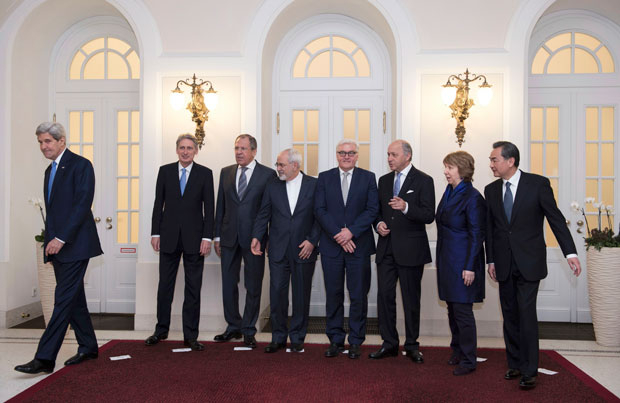
Vienna: Iran and world powers failed in an enormous diplomatic push to seal a landmark nuclear deal by a Monday deadline, deciding instead to give themselves seven more months to reach agreement.
Iran and the five permanent members of the UN Security Council plus Germany will seek to strike an outline deal by March 1 and to nail down a full technical accord by July 1, officials said.
“We have had to conclude that it is not possible to get to an agreement by the deadline that was set for today (Monday) and therefore we will extend... to June 30 2015,” British Foreign Secretary Philip Hammond said in Vienna.
“There will be further meetings in December. Our target is to reach a headline agreement, an agreement on the substance, within the next three months or so” and all technical aspects by July 1, he told reporters.
In the best chance to resolve the 12-year standoff over Iran’s nuclear programme, the so-called P5+1 world powers have been for months seeking to turn an interim deal with Iran that expires at midnight (2300 GMT) into a lasting accord.
Such an agreement is aimed at easing fears that Tehran will develop nuclear weapons under the guise of its civilian activities, an ambition Iran denies.
It could see painful sanctions on Iran lifted, silence talk of war and represent a much-needed success for both US President Barack Obama and his Iranian counterpart Hassan Rouhani.
A deal could begin a process in which the “the relationship between Iran and the world, and the region, begins to change,” Obama said in an ABC News television interview on Sunday.
But a last-ditch diplomatic blitz in Vienna in recent days involving US Secretary of State John Kerry and other foreign ministers failed to bridge the remaining major differences.
This included seven meetings since Tuesday between Kerry and his Iranian counterpart, Mohammad Javad Zarif, and numerous other gatherings in the Austrian capital.
Diplomats on both sides say that, despite some progress, the two sides remain far apart on two crucial points: uranium enrichment and sanctions relief.
Enriching uranium renders it suitable for peaceful purposes like nuclear power. But at high purities it is also used as the fissile core of a nuclear weapon.
Tehran wants to massively ramp up the number of enrichment centrifuges — in order, it says, to make fuel for a fleet of power reactors that it is yet to build.
The West wants the enrichment dramatically reduced, a move which together with more stringent UN inspections and an export of Iran’s uranium stocks, would make any attempt to make the bomb all but impossible.
Iran wants painful UN and Western sanctions that have strangled its vital oil exports lifted, but the powers want to stagger any relief over a long period to ensure Tehran complies with any deal.
In view of the difficulties, many experts long believed that the negotiators would put more time on the clock.
The conditions set by last November’s interim deal will remain in place until July, including a continued freeze by Iran of contentious parts of its nuclear activities.
In return, Iran will keep receiving around $700 million (Dh2.57 billion) in frozen funds per month, Hammond said.
Another extension — as happened with an earlier deadline of July 20 — however carries risks of its own, including possible fresh US sanctions that could lead Iran to walk away.












